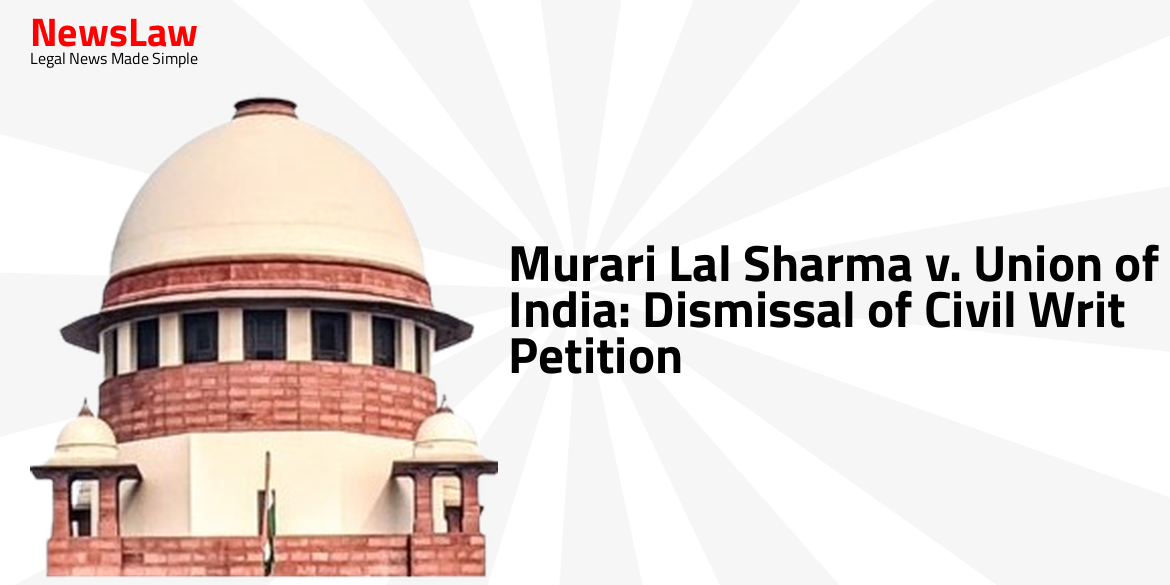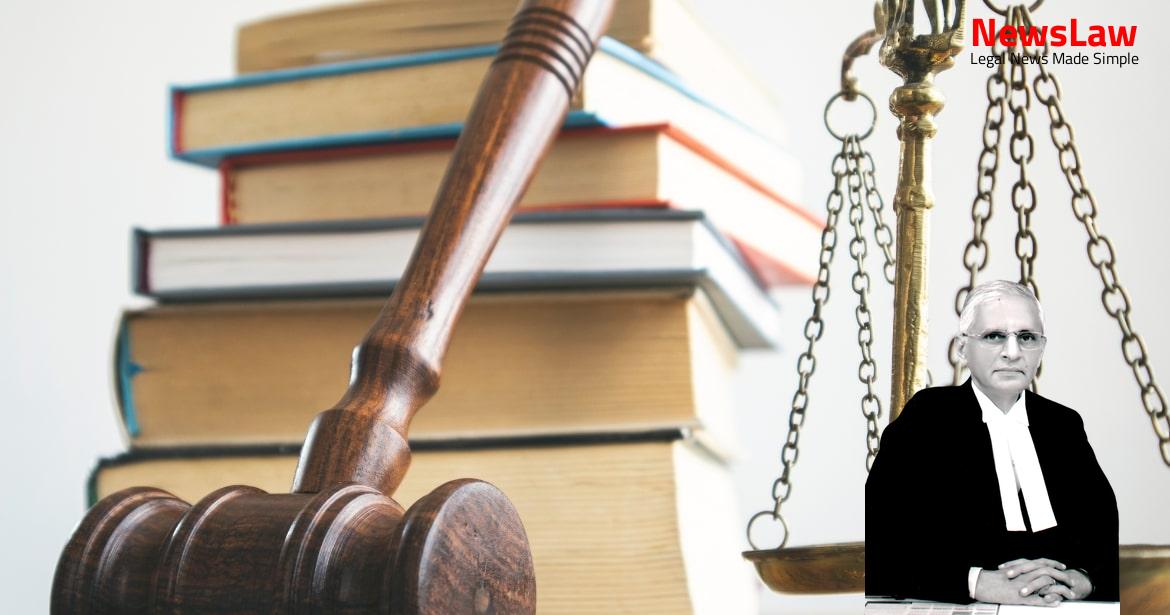In a significant legal case concerning property rights and family settlement, the Supreme Court of India delivered a crucial judgment. The case involved a dispute over ownership and bonafide requirement of a property. The ruling has implications on the rights of individuals in coparcenary property, as demonstrated by the parties involved in the matter. Learn more about the detailed analysis and decision by the Supreme Court in this landmark case.
Facts
- The Appellate Judge determined that the appellant lawfully became the owner of the property.
- The Appellate Judge found the case for release of the property to be valid based on bonafide requirement.
- An alternative shop was allotted to the respondents to mitigate hardship.
- Respondents were directed to vacate the premises and take possession of the alternative shop within one month.
- Respondents filed a writ petition under Article 227 of the Constitution of India before the High Court.
- The Prescribed Authority dismissed the petition for release of the premises.
- The Appellate Authority allowed the appeal filed by the appellant.
- High Court set aside the judgment and order passed by the Special Judge.
- Appellant filed a petition under Section 21(1)(a) of the Rent Act seeking release of the premises.
Also Read: Solapur Municipal Corporation vs. Majarewadi Gram Panchayat Employees
Arguments
- The learned senior advocate for the appellant argues that the authorities under the Rent Act had considered the matter and established the landlord-tenant relationship.
- The Prescribed Authority examined ownership as in a partition suit or title suit to reach a conclusion.
- The appellant’s father had previously filed an eviction suit against the predecessor of the respondents.
- In a family settlement, the property came to the appellant’s share, giving rise to a fresh cause of action for the premises in question.
- The learned senior advocate contends that the Appellate Judge’s conclusion was based on reappreciation of the matter.
- Ownership and bonafide requirement being established, the appellant asserts entitlement to release of the premises.
- The learned Single Judge and the Prescribed Authority both supported the appellant’s claim of ownership and need for the premises.
- The appellant, feeling aggrieved, has approached the court through this appeal.
- The father of the appellant filed a petition under Section 21(1)(a) of the Rent Act for release of the shop but it was dismissed by the Prescribed Authority in 1979.
- The appeal and writ petition against the dismissal were also unsuccessful.
- A Memorandum of Settlement was created in 2000 regarding the property.
Analysis
- The Prescribed Authority and the Appellate Authority found that the disputed property was coparcenary property in the hands of Dwarka Prasad, and Santosh Chaturvedi, being his son, had a right, interest, and share in the property.
- Evidence revealed a family settlement among Dwarka Prasad, his sons, and mother on 15.11.1999, leading to a repartition of the property on 09.04.1997.
- The ownership of the property was not raised as an issue by the Prescribed Authority under the Rent Act.
- The Appellate Authority emphasized that a share received in coparcenary property remains so for three generations, following a registered partition date of 09.07.1959.
- An oral family settlement on 15.11.1999 among family members was reduced to writing, and a memorandum of family settlement dated 02.02.2000 was confirmed by the decree of Original Suit No.220/01.
- The Appellate Authority noted that despite the appellant being born in 1977, he acquired a share in the property through the family settlement.
- The tenant failed to dispute the owner who had settled the property in favor of the appellant in an oral family settlement dated 15.11.1999, leading to the appellant’s claim of ownership over the property.
- The detailed examination of property rights was deemed unnecessary in a summary eviction proceeding when the tenant had not claimed title to the premises.
- The High Court and the Appellate Authority accepted the view that the tenant became the appellant’s tenant following the property transfer by the owner.
- Predecessor of the respondents had initiated a proceeding for alternate premises before raising ownership contention.
- Appellate Court’s view was deemed appropriate in the present facts and circumstances.
- Appellant’s bonafide need for the property was established due to wholesale business hardships.
- Absence of evidence of alternate premises for the appellant justified the release of the property.
- Order for alternate premises made by the Appellate Court was to minimize hardship.
- Release of the premises was required as appellant proved ownership and bonafide need.
- Judgments passed by the Prescribed Authority and Single Judge were not justified and hence set aside.
Also Read: Jagdishchandra v. Joint Charity Commissioner & Ors.
Decision
- Respondents are granted three months’ time to vacate and handover the vacant possession of the petition subject premises.
- An undertaking must be filed before the Court within three weeks.
- If the undertaking is not filed, the benefit of the time granted to vacate will not be available to the respondents.
- Judgment dated 09.10.2007 in P.A. Appeal No.1/2002 is restored if the undertaking is not filed.
- No order as to costs.
- The appeal is allowed accordingly.
- Release of the premises in question shall be made regardless of opting for alternate premises as ordered by the Appellate Court.
- All pending applications shall stand disposed of.
Case Title: SANTOSH CHATURVEDI Vs. KAILASH CHANDRA
Case Number: C.A. No.-006572-006572 / 2010



